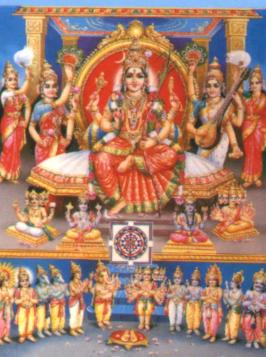Prayer is the highest form of communication with the Lord,and can be offered in simple words or as an elaborate ritual.The modes of prayer may differ from person to person,but the attitude is fundamental to all.Prayer helps to nurture one’s special relationship to the Lord –the relationship of the created to the creator-by invoking the devotee in the person.Unlike the other relatives roles (Father,mother, sister,disciple etc) one plays,the role of a devotee is non-demanding since the Lord seeks nothing from us.When one’s relationship with the Lord becomes primary in life,other relationships become secondary and,thus,less problematic.
Prayer has its purpose in helping one achieve an object of desire,be it mental clarity or a given end.Ultimately, prayer helps one gain the maturity to be qualified recipient of spiritual knowledge.This knowledge teaches us our identity with the Lord and helps us discover freedom and happiness,the nature of oneself.
Three types of prayer
Prater is expressed in three ways:physical, kayica:oral, vacika;, and mental manasa.A ritual or a puja is a physical form of prayer.Singing in praise of the Lord or chanting verses and Vedic hymns is an oral prayer.Japa or worship done silently is a mental prayer.
The results of Prayer
Like any other action.prayer produces a result.The result is twofold: one is immediately seen,drista- phala and the other is unseen,adrishta- phala.
The immediate result of prayer is the inner comfort that comes from acknowledging one’s limited capacities and accepting a power higher than oneself.Being objective about situations over which one has no control and praying to that all-knowing source is an act that free one from anxiety regarding the expectation of the result. The unseen result of prayer refers to the subtle result called punya,which accrues to the doer of the action. Punya manifests in the form of confortable situations whether in this life or later.When one prays for success,the accrued punya,which one may call “grace”,helps neutralize obstacles that one may not foresee.The”grace” may not ensure success,but without it the outcome could be worse.
The purpose of Prayer
A prayer may carry a different intent for different individuals. In theBhagavad Gita ,Lord Krishna describes four types of devotees .The first one is called aarta.This individual remembers the Lord only during crisis and difficultie. When things seem to be going fairly well,the arta attributes success to his efforts alone.
The second type of devotee is said to be an arthaarthii. This a religious person who is aware of the Lord’s grace in his life,but whose motivation for prayer stems fron seeking personsl ends.The arthaarthii is committed only to material gains and pleasures.Like the aarta,he alsoprays for relief of distress.
The third type of devotee is a jijnaasu.This person pursues knowledge for Moksha,freedom from unhappiness. Though moksha is a desirable end for all,only the jijnaasu recognizes knowledge as the means to his end and pursues itHis prayer is for inner growth and maturity for the sake of gaining this knowledge.
The jnaani is the fourth type of devotee.This is a wise person who knows his identity with the Lord .In the Bhagavad Gita,Lord Krishna describes the wise person as being one with the Lord.The jnaani’s prayer is an expression of wisdom,and is the highest form of prayer.
Invoking the Unknown factor
There are three factors necessary in accomplishing an end.The first factor is adequate effort,prayatna. One cannot accomplish anything in life without adequate effort.The second factor is time,kaala.Once effort is made,time is necessary for results to fructify.For example,when one sows a seed,time has to elapse for the plant to grow before it bears fruit.The length of time varies according to the nature of action and the result desired.
Depite making adequate effort and allowing sufficient time,the result may not always meet on’e’s expectations. One’s knowledge and power neing limited,one cannot foresee and make things happen as one wants.There is always an unknown element,the third factor,often called chance or luck.
A person who is sensitive and acknowledges the presence of the Lord sees this third factor as daivam.Such a person knows that the Lord’laws govern te results of actions and,through prayer,the person invokes the grace of those laws for obtaining desired results.The laws being nonseparate from the Lord,prayer is efficacious in accomplishing a given end.
I have taken this from “Vedic Heritage”prayers’ book. There are two more relevant topics-The meaning of Omkara & why we pray for three shanties.Wherever there is a double vowel it means it is a long vowel.

No comments:
Post a Comment